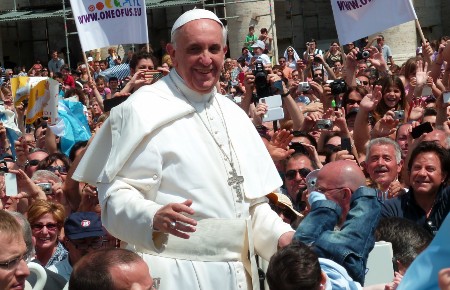 Hi readers, it seems you use Catholic Online a lot; that's great! It's a little awkward to ask, but we need your help. If you have already donated, we sincerely thank you. We're not salespeople, but we depend on donations averaging $14.76 and fewer than 1% of readers give. If you donate just $5.00, the price of your coffee, Catholic Online School could keep thriving. Thank you. Help Now >
Hi readers, it seems you use Catholic Online a lot; that's great! It's a little awkward to ask, but we need your help. If you have already donated, we sincerely thank you. We're not salespeople, but we depend on donations averaging $14.76 and fewer than 1% of readers give. If you donate just $5.00, the price of your coffee, Catholic Online School could keep thriving. Thank you. Help Now >
Maffeo Vegio
FREE Catholic Classes
(MAPHEUS VEGIUS.)
Churchman, humanist, poet, and educator, b. at Lodi, Italy, 1406; d. at Rome, 1458. The details of his life are gathered chiefly from his writings. Born of distinguished parents, his mother being of the house of Lauteria, Vegio passed his early youth at Lodi and Milan, where he completed his elementary studies under capable teachers. One of them, a great admirer of St. Bernardine of Siena, often took his pupils to hear the sermons of the saint of whom Vegio was later to be the biographer. At his father's direction Vegio undertook the study of philosophy in the University of Pavia, changing later to jurisprudence, and, finally, to letters, to which his tastes had always inclined him. He was passionately devoted to the ancient Latin poets and especially to Virgil. He produced his first volume of poems when sixteen years of age. For about ten years Vegio taught poetry and jurisprudence at the University of Pavia. He became an enthusiastic promoter of the revival of letters. Pope Eugenius IV appointed him Secretary of Papal Briefs, and later Apostolic Datary and a canon of St. Peter's. Vespasiano speaks of him at this time as a secular priest, but the date of his ordination is not known. In the service of the Church, Vegio's studies turned more to the Fathers and sacred sciences than to the classics, to St. Augustine instead of Virgil. Chiefly through his devotion to Augustine, Vegio was attracted to the Augustinians, and joined the order. He was buried in the Chapel of St. Monica, which he had caused to be erected in the Church of St. Augustine, Rome.
Vegio's poetical works are as follows: "Poemata et epigrammata", written about 1422; "De morte Astyanactis", on the death of Hector's son and the grief of Andromache (Cagli, 1475); "Velleris aurei", six books on the quest of the Golden Fleece (Cologne, 1589); "In supplementum Æneidos", which Vegio added to Virgil's "Æneid" to describe the destiny of Æneas, and which became the basis of his fame among later humanists (Paris, 1507); "Antoniados, sive de vita et laudibus S. Antonii" (Deventer, 1490). His prose works are: "De perseverantia religionis" (Paris, 1511); "De quattuor hominis novissimis, morte, judicio, inferno et paradiso meditationes" (Paris, 1511); "Vita Sancti Bernardi Senensis" in "Acta SS.", May, V, 117; "Sanctae Monicae translationis ordo. Item de S. Monicae vita et ejus officium proprium ", unedited: "Declamatio seu disputatio inter solem, terram, et aurum, audiente Deo et homine assistente", allegorical dialogue (Milan, 1497); "Philalethes, seu veritas invisa exulans", allegorical dialogue addressed to his brother Eustachius (Brescia, 1496); "De felicitate et miseria" (Milan, 1497); "Liber de significatione verborum in jure civili" (Vicenza, 1477), not extant; "de rebus antiquis memorabilibus Basilicae S. Petri Romae", valuable archaeological study, in four books, of St. Peter's Rome, in "Acta SS.", June, VII, 52; "De educatione liberorum et eorum claris moribus", a treatise, in six books, on the education of children and their moral foundation. The first three treat of the duties of parents and teachers in education ; the last three of the duties of the young to God, to their fellow-men, and themselves, of the several virtues, good manners, the use of time, etc. It is his most important work, and was for a long time attributed to Filelfo. It has the distinction of being the most Christian in spirit of all the humanistic educational treatises. It approves the study of pagan literature only in conjunction with sacred learning, the study of the Scriptures and the Fathers, makes provision for the education of girls, and considers the formation of a sound moral and Christian character to be the supreme end of education. Many editions of the work have appeared, the latest at Tournai, 1854 (Fr. tr., 1513; Ger. tr. 1856).
 Hi readers, it seems you use Catholic Online a lot; that's great! It's a little awkward to ask, but we need your help. If you have already donated, we sincerely thank you. We're not salespeople, but we depend on donations averaging $14.76 and fewer than 1% of readers give. If you donate just $5.00, the price of your coffee, Catholic Online School could keep thriving. Thank you. Help Now >
Hi readers, it seems you use Catholic Online a lot; that's great! It's a little awkward to ask, but we need your help. If you have already donated, we sincerely thank you. We're not salespeople, but we depend on donations averaging $14.76 and fewer than 1% of readers give. If you donate just $5.00, the price of your coffee, Catholic Online School could keep thriving. Thank you. Help Now >








 Daily Readings for Friday, April 26, 2024
Daily Readings for Friday, April 26, 2024 St. Cletus: Saint of the Day for Friday, April 26, 2024
St. Cletus: Saint of the Day for Friday, April 26, 2024 Prayer before the Closing of the Day: Prayer of the Day for Friday, April 26, 2024
Prayer before the Closing of the Day: Prayer of the Day for Friday, April 26, 2024


